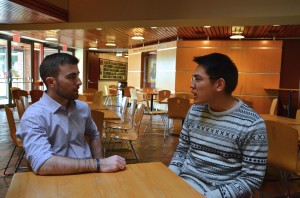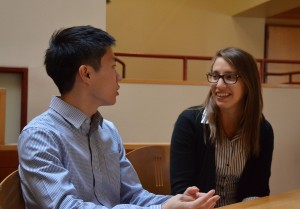There are students among us who have to balance the dual desire of protecting one’s country and pursuing an education.
After serving as a UN Peacekeeper in South Sudan during part of his service to South Korea, Jason Kwon ’14-’16 returned to Harvard as a junior to find that his freshman-year roommates had already graduated. After serving in the Israeli Army in the Chief of Staff’s Office, Moriya Blumenfeld ’16 joined a class of students whose average age was five years younger than hers. After working as a sergeant leader in South Korea, Jim Kim ’14-‘16 quickly learned that leading a squadron is totally different from leading a class discussion. After active military service for eight years, Logan Leslie ’16-’15 encountered the challenge of balancing his school life with caring for his wife and child.
One of the most rewarding aspects of attending a school like Harvard is meeting a diverse group of very driven and accomplished individuals. This includes students like the four mentioned above who dedicated their lives to serving their countries either before matriculating or during gap years. There is no doubt that these former military students embody the true meaning of service and loyalty to one’s country despite the difficulties that come with adjusting between two completely different lifestyles and coping with real threats to their countries.
Isolation and Connection
 These students may have experienced combat training and fighting on the ground, but none of that makes adjusting back to school life any easier. According to Kwon, “it was stressful because Harvard is a pretty competitive environment even without being gone two years. The last time I had read a textbook was two years prior, so it was definitely not easy coming back to the student mode.” Kim agrees, citing how everything was “upside down” when he came back to Harvard. It was difficult to transition from leading a squadron in South Korea to studying for exams and doing problem sets again. Serving in the military and attending college both can be stressful in their own ways, but they are totally different environments. In college, students have to balance tasks like finishing essays, organizing conferences, and rushing fraternities. However, in the military the stakes are much higher in terms of the real impact of their service and responsibility to protect their countries. Despite this difference, all four students said that the challenges at school should not necessarily be downplayed and that the difficulties they face in college are equally able to be transformative.
These students may have experienced combat training and fighting on the ground, but none of that makes adjusting back to school life any easier. According to Kwon, “it was stressful because Harvard is a pretty competitive environment even without being gone two years. The last time I had read a textbook was two years prior, so it was definitely not easy coming back to the student mode.” Kim agrees, citing how everything was “upside down” when he came back to Harvard. It was difficult to transition from leading a squadron in South Korea to studying for exams and doing problem sets again. Serving in the military and attending college both can be stressful in their own ways, but they are totally different environments. In college, students have to balance tasks like finishing essays, organizing conferences, and rushing fraternities. However, in the military the stakes are much higher in terms of the real impact of their service and responsibility to protect their countries. Despite this difference, all four students said that the challenges at school should not necessarily be downplayed and that the difficulties they face in college are equally able to be transformative.
Additionally, the age gap between military students and their peers can compound social differences. Because these students take time off either before matriculating or in between their years at the College, they are often much older than their peers. However, students like Blumenfeld do not let this get in the way of their experiences. “Age is a construct. Life is about experience. It is more about quality than quantity. Because people at Harvard have such an incredible accumulation of experiences, for me the age gap is not a big deal. Quality-wise we’re on the same page. We have all been exposed to all the amazing opportunities that this world has to offer.” Leslie agrees, saying how with a wife and two children he knows he won’t party or drink his first sip of alcohol in college, but he involves himself in the community in other ways, such as directing a chapter of the Warrior Scholar Project, a program that matches student tutors with veterans as they transition from the military to college.
This integration within the student community is often one of the most difficult obstacles these students face. Leslie recounts his first year at Harvard after eight years of service in Iraq, Afghanistan, and Qatar with the United States Army Special Forces Unit. “What I found myself doing here was withdrawing. It seemed like veterans could not contribute as much as they were able. It’s a huge challenge, but the answer is to become more involved in the student community.” When these former military students return to Harvard, the sudden change in lifestyle can cause feelings of isolation. However, they learn that engaging with other students and integrating into the community helps ease their transition.
The administration does not explicitly offer help, but at the same time these students are not expecting any special treatment. According to Blumenfeld, “Harvard is self-selective because the people who get here are knowledge-seeking. They love learning and are intellectually curious. In that sense, I don’t think I’m different from anyone else here at this school.” This feeling of connection to the student body can often serve as a way in which these students can overcome their sense of isolation and truly engage within the college community.
Real Threat
Concerns over meeting the next deadline for a problem set or interviewing for a summer internship occupy the thoughts of many Harvard students, but additional anxiety weighs on the minds of these former military students about issues that are much larger—and graver—in scope. Kwon knows that “if my country orders mobilization, I have to go. I know it’s dangerous. The absence of news headlines doesn’t mean there isn’t any danger. I know the threat is always there.” In fact, the main reason why compulsory enlistment exists in countries like South Korea and Israel is precisely because there is a constant threat of war. Because of this, not only is the risk of serving high, but also the individual contributions of each of these students are that much more important to their countries.
This certainly puts pressure on these students as they weigh the costs and benefits of choosing to study in lieu of continuing to serve. Blumenfeld describes the internal conflict she feels when she sees the seemingly daily news headlines recounting yet another terror attack or battle in Israel. “I really feel like I should be there with my family—with my people. In the short run it’s a sacrifice because I’m not in Israel. But in the long run, I know that what I’m doing right now will allow me to make things better in the future. In that sense, I’m very happy to be here.” Like many at Harvard, these military students view their time here as an investment that will pay off in the future when they will be able to apply what they have learned to improve their country’s prospects.
Despite their shared background, however, all four students envision their future service differently. Blumenfeld hopes to one day run for office in Israel and effect change through public policy. Kwon plans to pursue a graduate degree in international relations to study the intersection of war and politics, while Kim would like to work in finance and gain work experience in the United States. Some students like Leslie have already achieved a balance between academics and service; he currently serves in the Rhode Island National Guard while finishing his undergraduate degree. Leslie describes this as essentially “keeping a foot in two worlds” and being able to both serve his country and pursue an education.
The patriotism that emerges from dedicating their lives to serving their countries may actually be the one thing that sustains these students during difficult times. As Kim explains, “I spent the first 20 years of my life in South Korea. It felt really obvious for me to serve. While serving, I learned a lot about being loyal to my country and having a clear sense of my roots. If a war occurs, I know I’ll go back. Not because they force me, but because I really want to serve and help my country.” Though faced with unique challenges adjusting to the academic and social rigors of college life, military students bring with them a resilience that shows most clearly in their unwavering loyalty to their countries.
Image credit: Mattea Mrkusic

